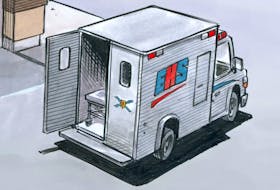Jamie Baillie took the job no one else wanted, but will leave it as possibly the biggest prize in Nova Scotia politics.
Baillie announced his intention to step down as Nova Scotia’s Progressive Conservative leader just five months after taking the party to within a few thousand well-placed votes of government. Nova Scotia’s Liberals won a slim majority last May, but hung on to several seats by razor thin margins.
Baillie leaves with the Tories next in line for the provincial government. His successor will be within a Liberal folly and an election call of the premier’s office.
The decision could not have been easy for Baillie. The life-long Tory from Truro wanted to be Nova Scotia’s Premier after watching the job up close while serving as John Hamm’s chief of staff from 2002 to 2005, but he said it is time to put his family first.
“We tell our families they come first. It’s important to show them that’s true,” he said Tuesday.
People don’t see the sacrifice families of political leaders make, and Baillie’s family commitment rings especially true given his proximity to the job he so wanted. He and his wife Sandra have two high school/college-aged daughters.
Baillie will stay on until a new leader is chosen, and promised the opposition Tories will continue to offer vigorous opposition, and fight for the issues they believe in, singling out mental health care.
Baillie won the leadership of the province’s PCs by acclamation, the only declared candidate for the post, in 2010.
It appeared the party was at its lowest ebb. After 10 years in power, many of them as a minority government, the Tories finished third in the 2009 provincial election, and seemed headed for an extended stay in the political wilderness.
Things got worse when Karen Casey, who served as interim leader in 2009-10, left the Tories to join Stephen McNeil’s opposition Liberals just three months after Baillie’s leadership became official. Casey made no secret that she had little taste for Baillie, although she didn’t have much time to acquire one.
Baillie entered the legislature as leader of the third party after winning a byelection in Cumberland South, a seat vacated for the new leader by MLA Murray Scott.
As leader, Baillie has consistently outperformed expectations. When the Liberals swept into office in 2013, the election was seen by most observers as a two-way race with the incumbent NDP.
The Tories baffled the experts by placing second, and Baillie became leader of the Official Opposition, the job he continues to hold.
Last spring the Liberals were expected to win re-election handily, but again, the Tories emerged as the election-night surprise, gaining seven seats and trailing the Liberals by just four percentage points in the popular vote.
Baillie’s term as leader has been plagued by polls showing low personal popularity. While he often polled behind his party, his strong election showings kept the rank-and-file firmly united behind his leadership. There were no Tory knives out for Baillie after either election loss.
Baillie leads a strong 17-seat opposition, rich in potential successors many of whom he recruited.
Rob Batherson was among the candidates Baillie recruited to run in 2017.
Batherson, who also served in John Hamm’s office, has been considered leadership potential for some time, although his loss to Liberal incumbent Labi Kousoulis in Halifax Citadel may hurt his chances. He finished third in a competitive race, close behind the NDP in a riding with a strong NDP tradition. The case will be made that the party needs a re-birth in Halifax to regain power, and Batherson’s leadership could fuel that re-birth.
The Tory legislative caucus has five women MLAs, any of whom could be considered for the leadership.
Among the new-comers, Cumberland North MLA Elizabeth Smith-McCrossin has gained exposure as health critic, and Barbara Adams from Cole Harbour-Eastern Passage, was a strong performer in the House. Cape Breton Richmond Tory Alana Paon is a giant killer, having defeated long-serving Liberal Michel Samson.
Karla MacFarlane from Pictou West is another possible contender, although geography may be an issue, given Tim Houston from Pictou East will almost certainly give the leadership serious consideration.
Cape Breton will deliver a candidate, likely in the person of Allan MacMaster from Inverness, a former party staffer who holds his own in the House. Another party staffer turned MLA, Chris d’Entremont, from Argyle-Barrington is the House Leader and would seem a natural contender, but some insiders believe he does not want the top spot. Kings North MLA John Lohr’s name was mentioned by some as a strong potential contender.
Cape Breton Regional Municipal Mayor Cecil Clarke is a former PC MLA and cabinet minister who some see as leadership material. The timing of the race may determine whether he’s in. When he was re-elected mayor in 2016, he indicated he intended to serve the full four-year term.
With the premier’s office in sight, there will be no shortage of possible candidates. The field will narrow considerably once those with aspirations start testing the waters. But given the stakes, this time the provincial Tory leadership won’t be won by acclamation.
Jim Vibert, a journalist and writer for longer than he cares to admit, consulted or worked for five Nova Scotia governments. He now keeps a close and critical eye on provincial and regional powers.








